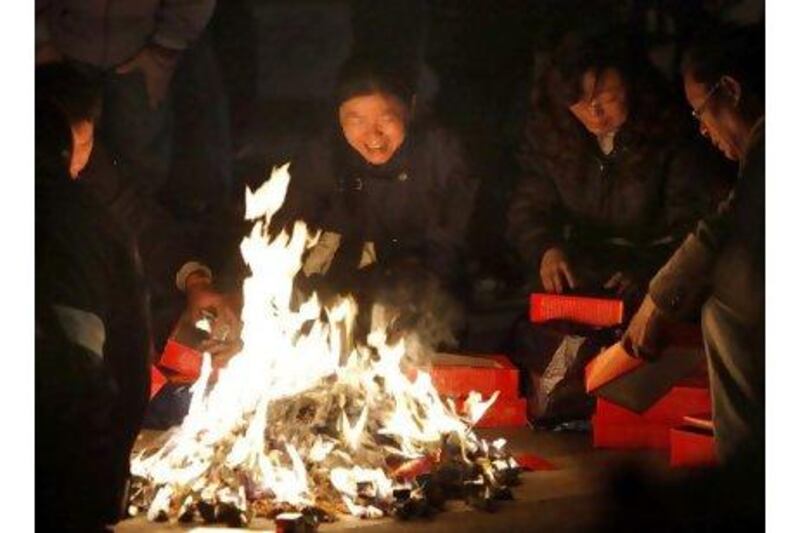BEIJING // The death toll from an apartment complex fire in Shanghai rose to 53 yesterday, and eight people were arrested amid concerns over lax enforcement of safety standards.
Official reports blamed unlicensed welders for Monday's fire, which also left 17 people in critical condition among the more than 70 hospitalised.
Experts yesterday said poor enforcement of fire regulations and a lack of fire-resistant materials in older buildings increased the dangers when fires broke out.
The fire in the 28-storey building started about 1.45pm on the 10th floor, spreading rapidly via scaffolding clad in flammable nylon netting. Firefighters were called at 2.15pm. It was more than four hours before the fire was extinguished.
The 13-year-old apartment complex, which contained 156 flats and housed 440 people, had been undergoing renovations to improve energy efficiency. Most of those critically hurt suffered smoke inhalation.
Eight people, at least four of them reported by media to be unlicensed welders, were detained by Shanghai police in connection with the incident.
Relatives yesterday expressed frustration at what they saw as poor safety standards. Shanghai's deputy police chief, Chen Jiulong, described the fire as "a man-made disaster", before pledging to pursue those responsible.
"It is hard to believe the government now. The drills on TV are successful, but when a fire truly happens, it's just useless. We feel helpless," a woman surnamed Liu, whose mother died in the fire, told the Associated Press.
"There must be something illegal in the construction materials, though we don't know. I am waiting for the government's explanation," she added.
According to Yik Waihung, a professor in the department of building services engineering at Hong Kong Polytechnic University, many older mainland buildings lacked the fire-resistant materials used during newer construction.
Also, he said apartment blocks as old as the one that caught fire often lacked firefighting equipment, such as fire hydrants. This can make it harder for firefighters to tackle blazes, although reports have not indicated that was the case yesterday.
Another mainland safety issue is narrow streets that can impede fire engines from reaching the scene of incidents, Prof Yik added, although in yesterday's emergency more than 60 fire engines were involved in fighting the fire.
While newer buildings have to comply with stricter regulations, including tougher fire-prevention measures and rules on the use of fire-resistant materials, he said enforcement could be a problem.
"We also hear that sometimes regulatory requirements may be over-ridden. That's certainly an issue," Prof Yik said.
Lax construction standards in mainland China are a subject often raised by local media.
"The situation is much, much better in Hong Kong, at least in most of the urban areas," Prof Yik said."Even in pretty old residential buildings we have regulations that require the buildings' owners to provide some fire hydrants so, if the firemen come, they can connect to them and pump water to the fire."
"I think there are still many buildings in China in the old districts that don't provide any firefighting equipment at all."






